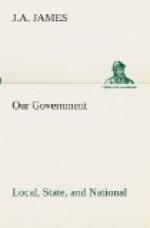Titles of Nobility and Gifts.—Clause 8. No title of nobility shall be granted by the United States; and no person holding any office of profit or trust under them shall, without the consent of the Congress, accept of any present, emolument, office, or title of any kind whatever from any king, prince, or foreign state.
According to the wording of the clause, Congress may allow gifts, of the kind mentioned, to be accepted by our National officials. Usually, however, such gifts pass into the keeping of government.
Powers Denied the States.—We recall the power of the States and weakness of the general government under the Articles of Confederation. It was plain to the members of the Constitutional Convention that hopeless confusion would arise if the States should also be given the right to coin money, pass ex post facto laws, etc. Therefore, certain prohibitions were made on the powers of the States. In Section 10, Clause 1, we note that these prohibitions are absolute, as:—
No State shall enter into any treaty, alliance or confederation; grant letters of marque and reprisal, coin money, emit bills of credit; make anything but gold and silver coin a tender in payment of debts; pass any bill of attainder, ex post facto law, or law impairing the obligation of contracts, or grant any title of nobility.[38]
[Footnote 38: In the celebrated Dartmouth College case, it was finally determined that a State legislature may not modify the terms of a contract. See Life of John Marshall, by Magruder, “American Statesmen,” new ed., 188-190.]
In Section 10, Clauses 2 and 3, the prohibitions are only conditional; thus:—
No State shall, without the consent of the Congress, lay any impost or duties on imports or exports except what may be absolutely necessary for executing its inspection laws; and the net produce of all duties and imposts laid by any State on imports or exports, shall be for the use of the Treasury of the United States; and all such laws shall be subject to the revision and control of the Congress.
No State shall, without the consent of Congress, lay any duty of tonnage, keep troops or ships of war in time of peace, enter into any agreement or compact with another State or with a foreign power, or engage in war, unless actually invaded or in such imminent danger as will not admit of delay._
More Complete Protection of Personal Rights.—By a careful reading of Sections 9 and 10, it is seen that some of the rights of the individual are guarded against encroachment on the part of government, either National or State. But the people felt that there were other personal rights which needed protection. They were familiar with the bills of rights in their own State constitutions. That the National Constitution did not also contain a bill of rights was, as we have seen, one of the chief arguments made against its adoption in the State conventions.




